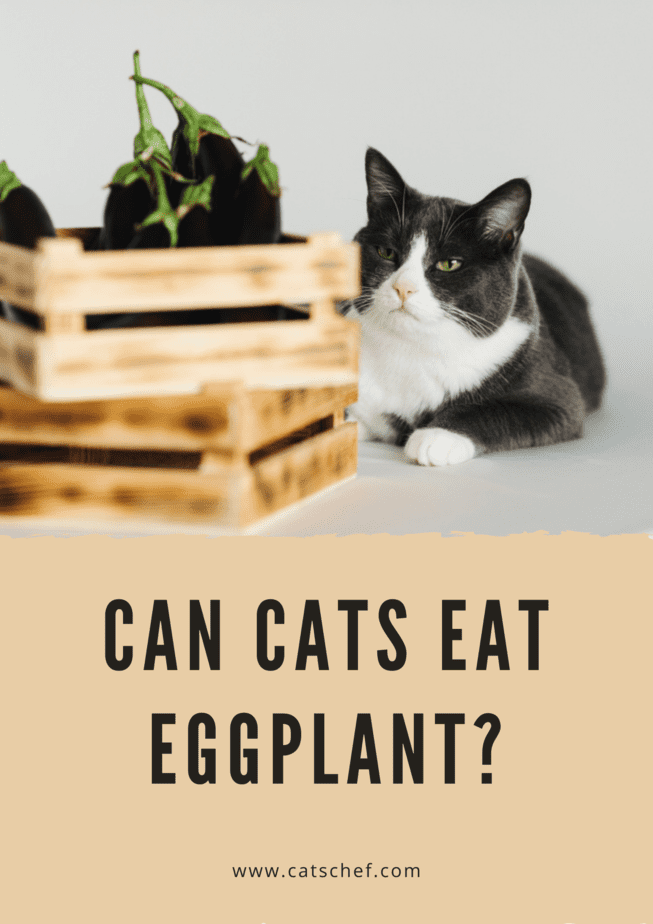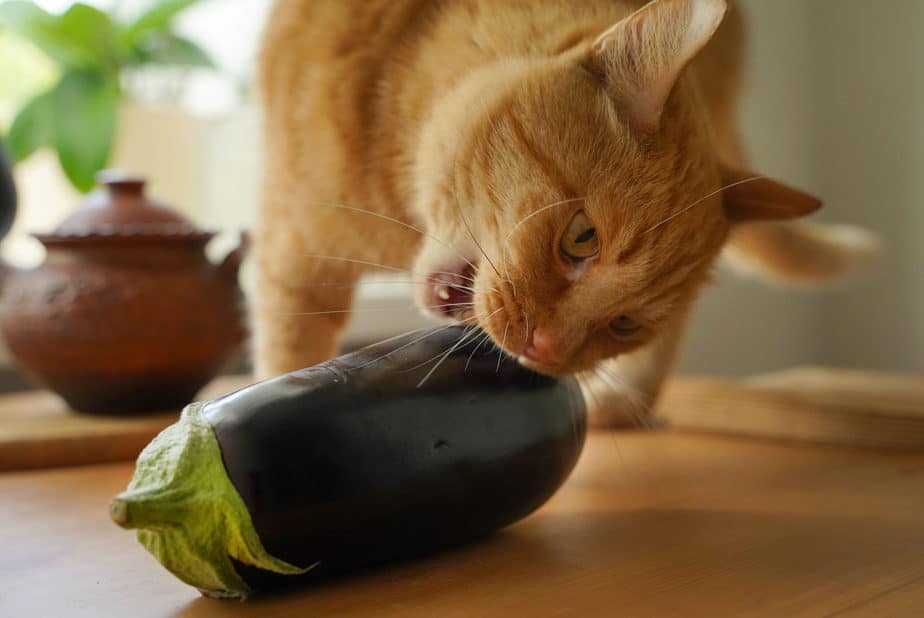It’s a widely-known fact that cats are obligate carnivores. However, a few bites of vegetables here and there won’t hurt, right? This makes us think can cats eat eggplant, for example.
But it depends on what kind of vegetable we’re talking about. Some can be beneficial but others might present potential harm.
Nevertheless, cats shouldn’t have vegetables as their main choice of food. They may help with some nutrient intake, but other than the occasional offering, stick with meat.
Vegetables don’t have the needed protein amount cats require. Although they can be a great source of some health supplements like vitamins and minerals, they can’t replace protein.
Is eggplant poisonous to cats?
Unfortunately, your cat will have to stay away from eggplant. They are considered poisonous to felines and their consumption carries certain health risks. Eggplant contains an alkaloid called solanine. This compound is toxic to cats and can lead to solanine toxicity.
Eggplants, potatoes, and tomatoes are members of the nightshade (Solanaceae) family of plants that share solanine as their common characteristic. For example, when potatoes turn green, they contain more alkaloids and have a more bitter flavor. This is also why most people advise discarding sprouted potatoes.
Green potatoes can make your cat ill to her stomach, causing nausea and diarrhea. A fever or a headache are also possible side effects. In the same way, eggplant is toxic to your feline, also containing high amounts of this alkaloid.
Can cats eat eggplant leaves?
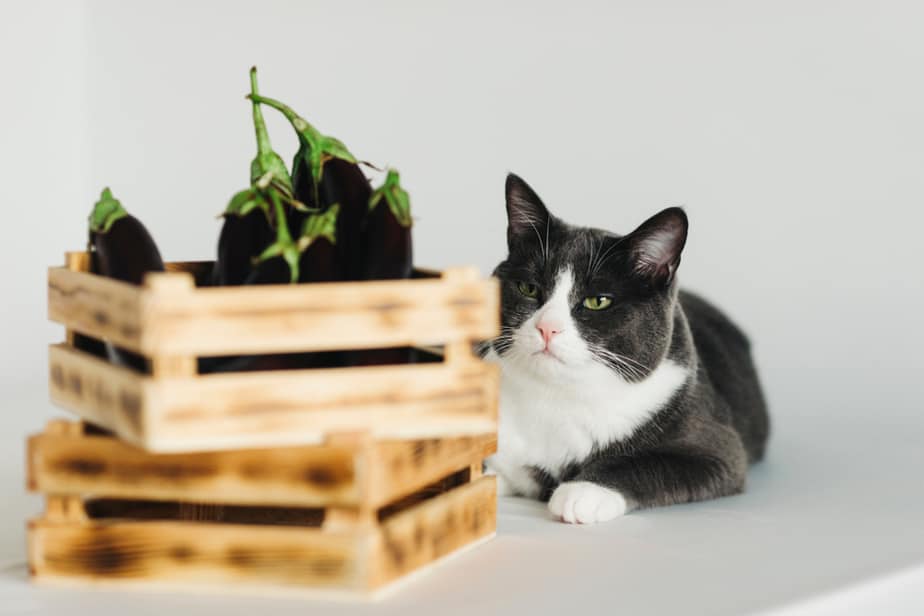
First of all, why would your cat ever feel the need to eat this part of an eggplant? Now I know why this question sounds so silly to cat owners. Sure, there can be some oddballs, but it’s uncommon for cats to show interest in eating this part.
However, if you do own a silly pet, she may just find herself in this kind of situation. Be quick to stop her from even nibbling on it as the leaves of this plant are also highly dangerous to felines.
In fact, they are considered to be more toxic than the fruit of the eggplant. Even humans can have consequences if ingesting this part of the eggplant. Still, cats are smaller and therefore, the risks are higher – they will get the short end of the stick.
What about eggplant seeds?
This is a hard no. Eggplant seeds are poisonous to felines just as the leaves or eggplant fruit. Cyanogenic glycosides are toxic chemicals produced by plants such as eggplant. This means that your cat should stay away from the seeds, or a single seed, for that matter.
The toxicity happens when the seeds come in touch with acids in a cat’s digestive system and create cyanide. This is a naturally occurring plant toxin found in seeds, stems, and leaves. It’s even dangerous for humans as it can cause gastrointestinal upset.
Is the stem of the eggplant poisonous?
Every part of this plant is toxic to felines. Don’t encourage your cat to try and nibble on them. When introducing any new food to your cat, first and foremost, you should research its impact on cats.
Some people stew the stem of the eggplant. If you do this, make sure your cat is nowhere in sight. The solanine contained in eggplant can poison your feline even via inhalation.
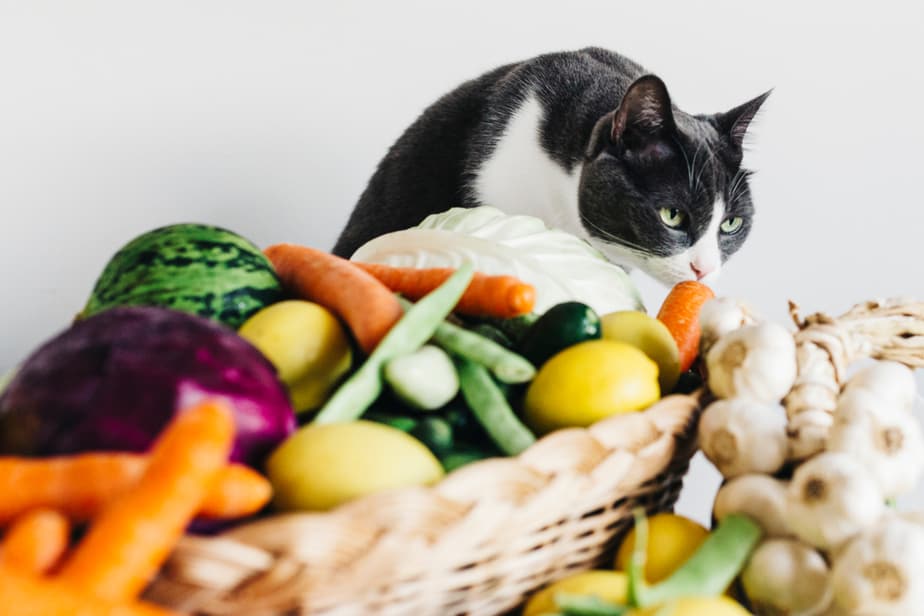
Can cats eat eggplant peels?
Vegetable peels aren’t normally poisonous to cats, although they can be tough to digest. By removing the veggie peels, you’re lowering the amount of work your cat’s digestive system has to do, as well as the possibility of her ingesting pesticides.
However, when it comes to eggplant, the skin is as dangerous to cats as any other part. When preparing eggplant for yourself, it’s also advisable you remove the skin, as it can taste bitter.
Dangers of eggplant: solanine and cyanide poisoning
Solanine can be found in the leaves, fruit, and tubers of plants. Solanine poisoning can result in a lethal gastrointestinal, neurological, and exanthematous crisis. Cyanide toxicity is less likely to happen. It’s because it’s produced when the parts of the plant come in contact with your feline’s digestive acids.
Solanine and cyanide poisoning have some similar symptoms. Headaches, dizziness, racing heart, shortness of breath, and vomiting are common early symptoms. Seizures, sluggish heart rate, low blood pressure, loss of consciousness, and cardiac arrest may occur after this period.
For the sake of your cat’s safety and your sanity, keep her away from eggplants. It can be a hard task but vet bills can also ruin your pocket. There are other safe vegetables your cat can munch down on, such as lettuce and bell peppers.
Can cats eat cooked eggplant?
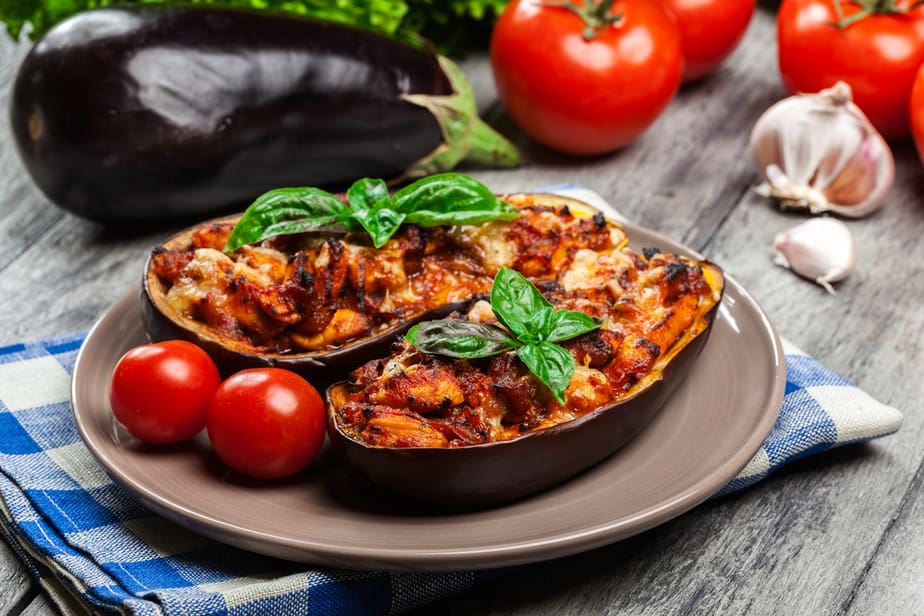
This is a widely-discussed dilemma in the cat world. While some people say that cooked eggplant is safer than raw, others strongly disagree. With the opinions being divided, we think it’s best to play on the safe side.
Some say that cooked eggplant is also dangerous to your feline. So, if you want to offer some to your cat, you have to make sure there are no traces of skin or seeds.
This is nearly impossible and still isn’t safe for your cat. Moreover, you’d have to leave it unseasoned and even then, there’s no guarantee your cat won’t have any consequences.
Some even argue that cooked eggplant is more poisonous than raw. It’s said that the seeds become more toxic when cooked. If you’re not sure about this either, we don’t recommend testing it out. It’s best to call your vet for help if your cat ate any part of this plant.
How much eggplant is dangerous to cats?
“Can cats eat eggplant and is there a safe dose of it?”
Well, even small amounts of raw eggplant are dangerous to cats. Therefore, make sure you supervise your cat in the garden at all times. That is if you grow certain foods like eggplant, tomatoes, and potatoes.
Your cat may have had a few small pieces of cooked eggplant. If she isn’t showing any signs of stomach distress, she will probably be fine. But make sure you monitor her for the next few hours for any signs of toxicity.
If you suspect your cat ate eggplant, it’s best to give your veterinarian a call. She/he will know what’s best for your cat and will provide the required treatment if needed.
Other vegetables that are bad for cats
Even though felines don’t necessarily need vegetables in their diet, they can sometimes serve as healthy snacks. But unfortunately, there are a number of vegetables that are harmful to cats.
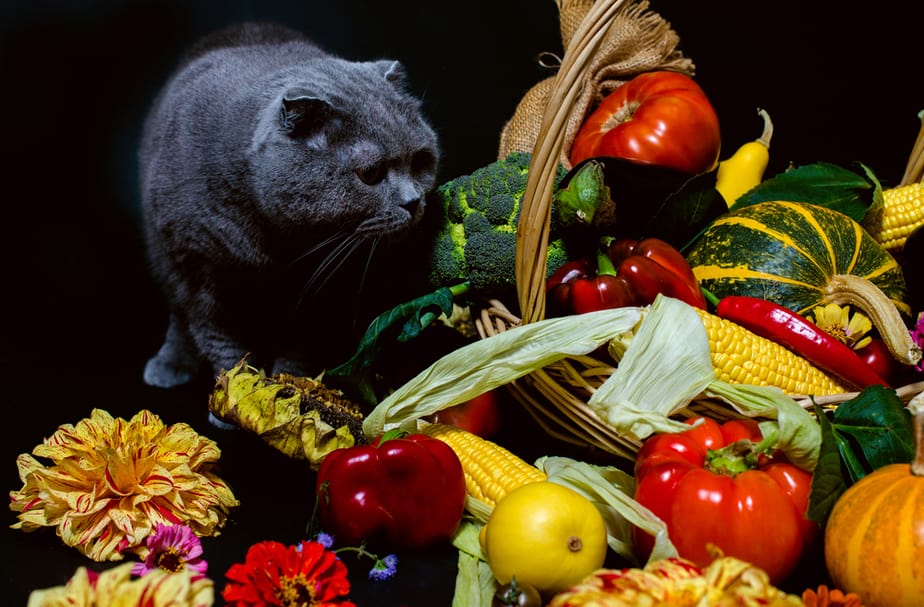
Garlic and onions
Some of the veggies that should be off the list are found in the Allium family. These include onions, garlic, chives, and others. These are highly poisonous to felines as they damage their red blood cells. This eventually leads to anemia, a health condition that can be fatal if left untreated.
Rhubarb
Apart from onions and garlic, rhubarb is another vegetable that’s dangerous to cats. Rhubarb contains a lot of soluble oxalates, primarily sodium and potassium oxalates. They are quickly absorbed into the body and bind to calcium in the blood, causing acute hypocalcemia.
Other nightshade family members
Besides eggplant, other members of nightshade plants are not recommended either. Tomatoes and potatoes also contain alkaloids that can be detrimental to your cat’s health. One alkaloid, in particular, is found in all of the nightshade family members.
Solanine, which we previously mentioned, has the same impact on felines’ health whether it’s consumed in eggplant, tomatoes, or potatoes. The stem and vine of tomatoes contain more alkaloids than the fruit. This is also one of the reasons cats can’t eat ketchup.
Safe veggies for your cat
If your cat is craving some vegetables, there are other safe alternatives to eggplants. For example, bell peppers, including green and red peppers, is a perfect way of adding veggies to her diet.
Next to these, lettuce isn’t just safe but can be beneficial to your cat’s health. Lettuce is high in water and fiber, which can help your cat stay hydrated while also aiding digestion.
You may catch your cat feasting on some okra or chickpeas. Although uncommon choices of foods, they can contain some valuable nutrients for your pet.
When it comes to carrots, they aren’t just bunny’s food. Vitamin K1, vitamin B6, and potassium are all abundant in these root vegetables. Carrots, in particular, are high in beta-carotene. Beta-carotene is converted into vitamin A in the body, which is necessary for cognitive and skin health.
Read more: Can Cats Eat Brussels Sprouts? Will They Make Your Furkid Pout?
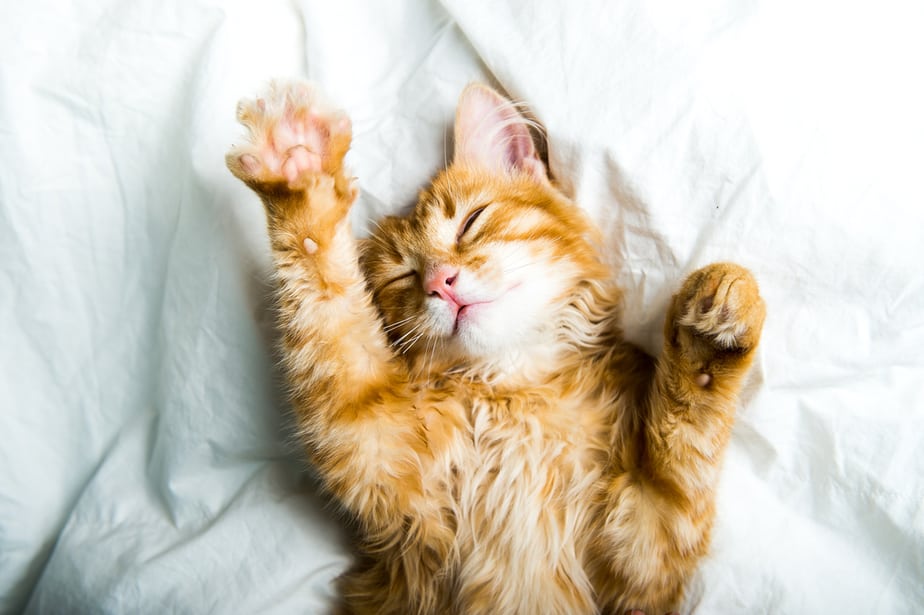
To sum up
Cats can’t eat eggplant as it’s highly toxic to felines. Raw eggplant fruit carries the same health risks as its leaves, seeds, peels, and stems. You should even avoid feeding cooked eggplant as it isn’t proven to be either safe or poisonous.
Solanine and cyanide poisoning are the main reasons eggplant presents such a risk to their health. Make sure you watch your cat when in the garden, so that she doesn’t come in contact with this vegetable.
If your cat has eaten eggplant, make sure you get in contact with your vet. You may see some mild symptoms of stomach distress, such as vomiting and diarrhea. Any severe symptoms of poisoning like trembling, drooling, and respiratory problems are a reason for concern.
Look out for other vegetables that are poisonous to felines. These include, but are not limited to, garlic, onions, rhubarb, tomatoes, and potatoes.
There are many vegetables that are safe for feline consumption, though, and can benefit their health. Make sure you include these in their diet as a safe alternative to eggplants.
See more: Can Cats Eat Radishes? Is This Root Safe For Your Snoot?
